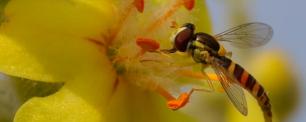
PIPOL Report [Translation in English]
Diagnosis of Wild Pollinators in Catalonia
This report provides a scientific basis for developing the Intersectoral Plan for the Conservation of Wild Pollinators in Catalonia, focusing on a diagnosis of the current status and the causes of decline of these insects at both global and local levels. In the second part, the report proposes specific actions to ensure the conservation of pollinators and improve the functionality of Catalan agricultural ecosystems.
The report was prepared with the goal of systematizing available scientific information to develop and implement the Intersectoral Plan for the Conservation of Wild Pollinators in Catalonia. The document is structured into two main sections.
In the first part, there is a detailed diagnosis of the ecological and economic importance of pollinators, their population status on a global, European, and Catalan scale, and the main causes of their decline. This includes the effects of intensive agriculture and the crucial role these insects play in the pollination of both cultivated and wild species. Additionally, this section introduces the knowledge gaps that must be addressed to mitigate pollinator loss and ensure their contribution to biodiversity and essential ecosystem services.
The second part identifies priority areas for action and proposes a series of specific conservation measures for the Catalan territory, aiming to ensure the ecological functionality and stability of agricultural ecosystems. These actions include the restoration of multifunctional margins, the protection of beneficial fauna species, and the promotion of public awareness about the benefits of wild pollinators. This intersectoral approach seeks to align Catalan policies with new commitments at the European and global levels, such as the EU's 2030 Biodiversity Strategy.
The report concludes with key messages and recommendations to establish a robust framework for monitoring and continuous improvement for pollinator protection in Catalonia.
Coordination
Santi Pérez¹, Sara Pont¹, Jordi Bosch²
¹Service of Natural Environment Planning. Sub-Directorate General of Biodiversity and Natural Environment. Department of Climate Action, Food, and Rural Agenda. Government of Catalonia
²Center for Ecological Research and Forestry Applications (CREAF)
Authors
Jordi Bosch Gras¹, Constantí Stefanescu Bonet², Laura Roquer-Beni¹,³, Anselm Rodrigo Domínguez¹,³, Georgina Alins Valls⁴, Santi Pérez Segú⁵
¹Center for Ecological Research and Forestry Applications (CREAF)
²Granollers Natural Science Museum (MCNG)
³Autonomous University of Barcelona
⁴Institute of Agrifood Research and Technology (IRTA)
⁵Service of Natural Environment Planning. Sub-Directorate General of Biodiversity and Natural Environment. Department of Climate Action, Food, and Rural Agenda. Government of Catalonia
Design
Nora Soler, José Luis Ordóñez, and Anna Ramón
Center for Ecological Research and Forestry Applications (CREAF)
Project webpage:
Wild pollinators in Catalonia: Report on status, threats and priority areas of action for their conservation | CREAF
Original en català:
Informe diagnosi dels Pol·linitzadors Silvestres a Catalunya [CAT] | CREAF
Traducción al castellano:
Informe diagnóstico de los Polinizadores Silvestres en Cataluña [ES] | CREAF










